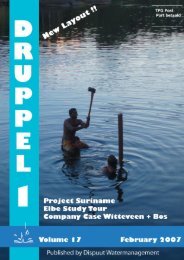Druppel 15-2 - Dispuut Watermanagement
Druppel 15-2 - Dispuut Watermanagement
Druppel 15-2 - Dispuut Watermanagement
Create successful ePaper yourself
Turn your PDF publications into a flip-book with our unique Google optimized e-Paper software.
Water Resource Management<br />
Willem Malda has finished his studies in februari 2005. His graduationwork<br />
dealed with a WM-canal and it’s control techniques. Therefor he visited the<br />
Water Conservation Laboratory in Phoenix (Arizona, United States).<br />
Masterthesis Waterresource Management<br />
Model Predictive Control on Irrigation Canals,<br />
"Application on the WM-Canal"<br />
In March last year I started to look for a<br />
master thesis research topic. My goal in<br />
this search was to find a challenging<br />
assignment. During the search I joined<br />
the class of Operational Water<br />
Management, which I found very interesting.<br />
Especially the mixture between<br />
water management and system control I<br />
found interesting. Part of my graduation<br />
period I spend at the United States<br />
Water Conservation Laboratory (USWCL)<br />
in Phoenix, Arizona. Here I studied the<br />
WM-Canal and the control techniques<br />
that are used to control this canal.<br />
A lot of research that is done on controlling<br />
irrigation canals is done on this<br />
particular canal in Arizona. Most of the<br />
controllers studied before use control<br />
techniques that do not take the constraints<br />
of the irrigation system into<br />
account. To take these constraints into<br />
account during control a control technique<br />
called Model Predictive Control<br />
can be used.<br />
Model Predictive Control (MPC) is a control<br />
methodology that can efficiently<br />
control systems taking into account various<br />
types of constraints. It originates<br />
from the chemical process industry. In<br />
the 70s the search for optimization<br />
changed from supply driven production<br />
to a production based on the prediction<br />
of the demand. MPC uses all relevant<br />
measurements and predictions within an<br />
optimization to calculate the optimal<br />
control action taking into account the<br />
physical and operational constraints.<br />
Because MPC is able to use an internal<br />
model to minimize an objective function<br />
this method of control is promising for<br />
application in irrigation systems.<br />
Therefore research is done on the application<br />
of MPC on irrigation systems.<br />
Cost Function Constraints Future Disturbance<br />
Present and Future<br />
Setpoints<br />
-<br />
+<br />
-<br />
Present and Future<br />
Errors<br />
Optimization<br />
Present and Future<br />
Inputs<br />
Internal Model<br />
Present and Future<br />
Outputs<br />
Open Loop<br />
Output<br />
Future Output<br />
Controller<br />
Real System<br />
Present Input<br />
Actuators<br />
Real System<br />
Canals<br />
Present Output<br />
Closed Loop<br />
Output<br />
Present Output<br />
12











